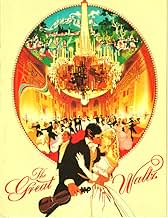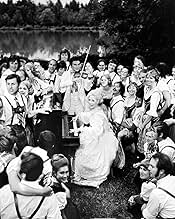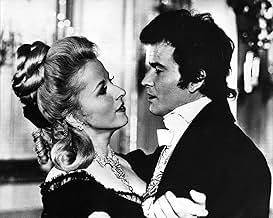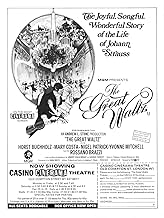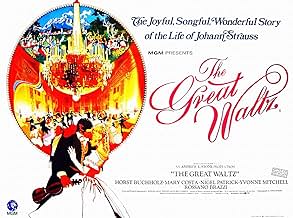Agrega una trama en tu idiomaComposer Johann Strauss becomes the "Waltz-King" and woos a baron's mistress in 19th-century Austria.Composer Johann Strauss becomes the "Waltz-King" and woos a baron's mistress in 19th-century Austria.Composer Johann Strauss becomes the "Waltz-King" and woos a baron's mistress in 19th-century Austria.
- Premios
- 1 nominación en total
- Dirección
- Guionista
- Todo el elenco y el equipo
- Producción, taquilla y más en IMDbPro
Opiniones destacadas
Forrest & Wright, made magic adapting classical themes into the Broadway hit KISMET and before that for Eddy & MacDonald's screen operettas. They created a score based on the often ravishing music of the Strauss family, but it is not among their best efforts. This remake of THE GREAT WALTZ was filmed in some spectacular ballrooms, but all the hoop skirts, marble and crystal chandeliers cannot make up for a witless screenplay, wooden acting, and incredibly unimaginative camera work. As a longtime fan of the Strausses and operetta, I found this a profound disappointment. No wonder this is blamed for helping to kill off screen musicals in the 1970s.
I've always loved the music of Johann Strauss. Years ago I drove to a small theater in South Milwaukee to see the 1938 MGM movie *The Great Waltz*, a schmaltzy but well-made concoction with the inimitable Meliza Korjus and the very aggravating Louise Reiner that was very loosely based on Strauss's life.
Also years ago I bought a recording of the 1949 musical *The Great Waltz*, on which this movie is very loosely based. Like *The Song of Norway*, which had been a huge success on Broadway in 1944, mostly because of its elaborate dance numbers, "The Great Waltz" was a Robert Wright/George Forrest concoction that used music by the composer whose biography was more or less the subject of the show.
I never saw that show, so I don't know how similar this 1972 movie is to it. What I do know, however, is that this movie is a lavishly staged disaster. The script, what there is of it, is all cliches. (The scene where Strauss comes up with the idea for *Tales from the Vienna Woods* is stolen, poorly, from the 1938 movie.) It is interrupted repeatedly for no clear reason by a series of elaborate but not very interesting dance numbers. (Imagine an unimaginative *Seven Brides for Seven Brothers*.)
Worse still, most of the characters are not likable. Strauss Jr. comes off as an unfeeling womanizer, like his father before him. Strauss' wife isn't likable enough to earn our sympathies, even though he is not good to her.
In short, there's really nothing to like in this movie other than Strauss's music, which is well performed, and the scenery and costumes. (Much of the movie was evidently filmed in Austria.) The 1938 *Great Waltz* is not a great movie and has more than its share of chiches, but it's still a lot more enjoyable than this sad remake.
Also years ago I bought a recording of the 1949 musical *The Great Waltz*, on which this movie is very loosely based. Like *The Song of Norway*, which had been a huge success on Broadway in 1944, mostly because of its elaborate dance numbers, "The Great Waltz" was a Robert Wright/George Forrest concoction that used music by the composer whose biography was more or less the subject of the show.
I never saw that show, so I don't know how similar this 1972 movie is to it. What I do know, however, is that this movie is a lavishly staged disaster. The script, what there is of it, is all cliches. (The scene where Strauss comes up with the idea for *Tales from the Vienna Woods* is stolen, poorly, from the 1938 movie.) It is interrupted repeatedly for no clear reason by a series of elaborate but not very interesting dance numbers. (Imagine an unimaginative *Seven Brides for Seven Brothers*.)
Worse still, most of the characters are not likable. Strauss Jr. comes off as an unfeeling womanizer, like his father before him. Strauss' wife isn't likable enough to earn our sympathies, even though he is not good to her.
In short, there's really nothing to like in this movie other than Strauss's music, which is well performed, and the scenery and costumes. (Much of the movie was evidently filmed in Austria.) The 1938 *Great Waltz* is not a great movie and has more than its share of chiches, but it's still a lot more enjoyable than this sad remake.
After several requests, TCM aired the 1972 remake of The Great Waltz this past week. For fans of Strauss waltzes, history and Vienna, this movie will just hit the spot. "The world worships the original", but unlike the studio backlot photographed 1939 B&W version, the 1972 version was shot in PANAVISION and was the last film to be theatrically shown in CINERAMA. MGM went all out in using on-location photography throughout Austria and Vienna, including the Blue Danube river. Horst Bucholtz and Mary Costa did a terrific job in the leading roles, and it was a very enjoyable musical review of the struggle of father and son in leaving the world with their great compositions. I agree, the directing swayed between drama and comedy, but such is life. It is unfortunate this film has not been made available to it's fans and followers on DVD, or even digital download. Let's hope TCM and the Warners Archives Collection makes it possible for at least a made-on-demand DVD.
This big budget major Hollywood studio movie has never received a home video release, and it's pretty easy to guess why. Certainly there being no big stars in the cast plays a factor, as well as the fact that Strauss today is nowhere as popular as what plays on the radio most of the time nowadays. But I think another large factor dooming the movie to obscurity is that it comes across as very old fashioned. Even considering what society was like in the 1970s, I am sure people who saw the movie back then felt the movie played out more like a movie made 30 or so years earlier.
There are a couple of additional problems with the movie. First, the movie's look into Strauss is for the most part lacking focus. For the most part, we don't learn what drove him, or what he was like as a person. There are large stretches of the movie when he becomes a secondary character. The second problem is that the movie has a number of touches that are unintentionally silly, from the singing narrator to the dance choreography.
I will say the movie looks good, from the cinematography to the locations. In that aspect, the old saying that you can't polish a... well, you know... does not apply to this particular movie. But a glossy look doesn't really compensate that much for 135 otherwise misguided minutes.
There are a couple of additional problems with the movie. First, the movie's look into Strauss is for the most part lacking focus. For the most part, we don't learn what drove him, or what he was like as a person. There are large stretches of the movie when he becomes a secondary character. The second problem is that the movie has a number of touches that are unintentionally silly, from the singing narrator to the dance choreography.
I will say the movie looks good, from the cinematography to the locations. In that aspect, the old saying that you can't polish a... well, you know... does not apply to this particular movie. But a glossy look doesn't really compensate that much for 135 otherwise misguided minutes.
This film is about the life of Johann Strauss Jr. Horst Bucholz is good in this role. He ages well over the course of the film.
Mary Costa plays his eventual wife Jetty. Miss Costa was an international sensation in her day as a major opera star. Her beautiful soprano voice is heard on the soundtrack here.
The direction here is unintentionally funny.
The music and the singing by Miss Costa are the main attraction of this film.
Mary Costa plays his eventual wife Jetty. Miss Costa was an international sensation in her day as a major opera star. Her beautiful soprano voice is heard on the soundtrack here.
The direction here is unintentionally funny.
The music and the singing by Miss Costa are the main attraction of this film.
¿Sabías que…?
- TriviaThis film was presented in the Cinerama format overseas. This would be the last film shown in Cinerama.
- ErroresAll of the men's hairstyles and sideburns are strictly in the longer, trendy 1972 international mode, a far cry from 19th-century Austria.
- ConexionesFeatured in Strauss and Vienna: On Location: The Great Waltz (1972)
Selecciones populares
Inicia sesión para calificar y agrega a la lista de videos para obtener recomendaciones personalizadas
Detalles
Taquilla
- Total en EE. UU. y Canadá
- USD 890,450
- Tiempo de ejecución2 horas 15 minutos
- Mezcla de sonido
- Relación de aspecto
- 2.35 : 1
Contribuir a esta página
Sugiere una edición o agrega el contenido que falta

Principales brechas de datos
By what name was The Great Waltz (1972) officially released in India in English?
Responda
